|
St. Maximilian Kolbe is heralded as the Saint of Auschwitz. In a remarkable act of love and humility, the Polish priest offered his life for a father when faced with execution in the Auschwitz concentration camp during the Holocaust. While we often define our saints by one ultimate act – their martyrdom, a profound miracle, or a moment of boldness for God – St. Maximilian, like our other saints, is so much more than one supreme moment of magnanimity. St. Maximilian Kolbe was a mover, a shaker, a deal maker, and an innovator, especially when it came to Catholic media. Allowing his full story to illuminate his sainthood will help us all become more in tune with our own call to do more – to be more – for the glory of God. If we only think about St. Maximilian as the Saint of Auschwitz, it can be limiting, but oddly freeing. It’s easy to think, “Wow, what an incredible act of love for the other!” while knowing that most of us will never have that moment of choice in our lives. It’s easy to be inspired by him and revere him for his great courage rather than internalize how this might affect us day to day. We see the grandeur of other saints too and we forget that they were normal people with interests and complicated lives like ours. Keeping them on a pedestal, while probably enhancing our prayer life, hinders us from relating to the saints and allowing their example to influence the monotony of our daily lives. In the last ten years, there is a sort of movement in the Catholic Church today to fully illustrate the life of the saints, and most of this is done through Catholic media. My first experience with this was when I saw Word on Fire and Bishop Robert Barron’s “Pivotal Players” series, which tells the stories of twelve pivotal saints in the places where they grew up sharing how they became the people that made them saints. My husband and I hosted several people from our young adult group at our house to watch this series together and then discuss how these saints are relevant for our lives today. Of course this bore tremendous fruit, not only in the beautiful conversation and personal stories, but in a small group fluctuating between six to ten people each week, two couples emerged from that group who ended up getting married. We were thrilled that they not only met in our home, but that the stories, legends and lives of the saints was the catalyst for them discovering their vocation as husband and wife. That series grounded these wonderfully holy saints to be real for us; their miracles continue as hearts are moved by learning about who they are. This brings me back to St. Maximilian Kolbe. After watching this series, I started taking time on a saint’s feast day to read the blurbs about who they are, where they came from, and their supreme act. I would take the short five minutes to envision that time, their challenges, and how they rose above conflict for their ultimate “yes” to God’s call. For St. Maximilian, I challenge you to take some time to read his story today or watch some videos about him. There are also some great films about his life. Something about him that animates my work (MAX Studios is named after St. Maximilian Kolbe) is his awareness of the importance of media. This was the early 1900s (St. Maximilian died when he was only 47 years old) and you can imagine all the new media that was coming out at that time. St. Maximilian attended the Olympic games in 1936. He went to Berlin, not to see the competition, but because there was an exhibit showcasing television and technology. He said, “While building churches that are beautiful and spacious is important, without Catholic media, these churches will be empty.” How true is that even for today? That simple story resonates with our current time with such gravity that we have to take it to heart. Catholic media, while it can be contentious or annoying depending on your preferences, it’s undeniable that it bears fruit. In unexpected ways, the stories of the saints like St. Maximilian Kolbe – in written format, in dynamic video, in interesting podcasts – have tremendous meaning that supersedes time and space because the Holy Spirit moves through these narratives. In our Catholic storytelling, the saints become normal people, so that all people can see their universal call to holiness, and that call is realized through recognition of one’s vocation as called by Jesus Christ. I think back to those marriages that emerged from that small group. Maybe those couples would have met under other circumstances, but how incredible that a part of their story is an attraction to one another after studying the lives of our most revered saints – through the proliferation of dynamic Catholic media. Take time to know the saints who are honored in our church because their lives still perpetuate miracles beyond their earthly death. I believe St. Maximilian Kolbe is challenging us in this day and age to use Catholic media to its fullest to bring people to see their vocation in Jesus Christ as the ultimate calling. We have so much at our fingertips, that to engage in Catholic media, especially in community to share and discuss, it brings to life and grounds our rich and vibrant Scripture and Tradition. Today, we remember St. Maximilian Kolbe – a true innovator and evangelist. Now, go explore and share some Catholic media to celebrate him. Extras: National Shrine of St. Maximilian Kolbe Pivotal Players | Word on Fire The Amazing Story of St. Maximilian Kolbe by John Clark | Magis Center VIDEO: St. Maximilian Kolbe w/ Bobby Angel | Ascension Presents
0 Comments
As we begin this month of August, we trudge into another month of Ordinary Time in the liturgical calendar. That doesn’t mean, however, that we don’t have much to look forward to with feast days this month. August is filled with feast days from saints who lived less than a century ago, all the way to saints from the early Church—from religious to laity, from saints I’ve learned about my whole life, to saints I had never heard of before. Let us take time throughout this month of August to learn about the Christ-filled lives of these powerful saints. Saints who Founded Religious Communities: There are many saints this month who founded religious communities—all of which have had a great impact on the Church. St. Dominic founded the Dominicans, also known as the Order of Preachers, which is a religious order known for their preaching and rich intellectual history. St. Clare of Assisi worked with St. Francis of Assisi and helped found the Poor Clares, a group of contemplative nuns and the second branch of the Franciscans to be founded, just after the Order of Friars Minor. Back in the time of the early church, St. Augustine wrote the Rule of St. Augustine, which became the foundation for the Augustinians. In the 12th century, St. Bernard of Clairvaux helped spread the Cistercian Order, an order of monks and nuns that branched off from the Benedictines and remains strong today. St. Cajetan helped found the Theatines which became a religious order with many bishops and intellectuals in the Church. With the help of St. Francis de Sales, St. Jane Frances de Chantal founded the Visitation Order which was a religious order open to women who had been turned down from other orders for poor health or similar reasons. The French mystic St. John Eudes founded two religious orders in the 1600s, both following St. John Eudes’ special devotion to the Sacred Hearts of Jesus and Mary. More recently, in the 18th century, St. Alphonsus Liguori founded the Redemptorists, a religious community with a special devotion to Our Lady of Perpetual Help. In the 19th century, French priest St. Peter Julian Eymard helped found two religious orders, both with a special devotion to the Blessed Sacrament. At first, I found this list quite overwhelming. These saints founded and/or helped spread their religious orders, something I can’t even fathom, especially in our pandemic-affected world today. But then I recognized the beauty that comes to the Church as a result of this wide range of religious communities. Each community is called to follow their own unique charism, all while growing closer to Christ and bringing Him to others. After sitting with this, I realized that there is beauty in the lives of each of these saints and in how the Church works in many ways, through many charisms, to help lead everyone to a life of holiness. Martyrs in the Month: In a six day stretch next week, we will celebrate three well-known martyrs in the Church. Back in the early Church, St. Lawrence was killed and is famous for his quips as he was being grilled to his death—showing his faith in Christ to the end. Much more recently, St. Teresa Benedicta of the Cross was a Discalced Carmelite nun who was killed at the Auschwitz concentration camp during World War II because of her Jewish heritage. Similarly, St. Maximillian Kolbe was martyred at Auschwitz, giving his life in place of another prisoner, and was thus bestowed the title “martyr of charity”. While we may not face martyrdom like these saints, we can learn from how they trusted Christ and pray for their intercession in our lives. Saints and Their Country: Later this month, we will celebrate the feast days of three saints who are known by their primary locations: St. Stephen of Hungary, St. Louis of France, and St. Rose of Lima. These saints all lived incredible lives, all very authentic to the community in which they lived. As we progress through this month, these saints can serve as role models for us in how we can follow Christ and bring others to Him in whatever region we find ourselves. As we walk through this August, let us look to the lives of the saints to learn to be saints right where God has called us to be through whatever charism He calls us to. To learn more about the saints, visit our Catholic Feast Days Website by clicking here. To view a calendar of the feast days in August, and each month, click here.
Let’s face it: We live in a world that doesn’t really understand the meaning of love. We hear this word “love” thrown around a lot. There are any number of things we can say that we love in a day: our latest tv show binge, a favorite food, or place that we have travelled. We use this word with such inconsistency that it has begun to lose its meaning. How often do we succeed at recognizing and paying accolades to these “lesser loves” while failing to acknowledge the people and moments that actually deserve our recognition? All the while we are too easily forgetting Jesus, who is Love made flesh. The Gospel of John says, “No one has greater love than this, to lay down one’s life for one’s friends.” While the world proposes time and time again that we settle for lesser loves, the Gospel promises us that if we want to find our lives - if we want to find love - we must lay ourselves down. St. Maximilian Kolbe, whose feast we celebrate today, exhibited this in a way that was truly heroic. Not only did he defend and promulgate the faith during the height of World War II, but he, in a final act of heroic love, also laid down his life for a man randomly selected to die in a starvation chamber at Auschwitz. When St. Maximilian Kolbe was asked who he was by the Nazi guards, he simply responded: “I am a Catholic priest.” Maximillian Kolbe’s sacrifice is what the Church calls an act of “redemptive suffering” – suffering which allows and invites us to participate in Christ’s redeeming sacrifice and make manifest the love of God. The Catechism states: The cross is the unique sacrifice of Christ, the "one mediator between God and men". But because in his incarnate divine person he has in some way united himself to every man, "the possibility of being made partners, in a way known to God, in the paschal mystery" is offered to all men. He calls his disciples to "take up [their] cross and follow (him)",[Mt.16:24] for "Christ also suffered for (us), leaving (us) an example so that (we) should follow in his steps."[1Pet.2:21] In fact Jesus desires to associate with his redeeming sacrifice those who were to be its first beneficiaries. This is achieved supremely in the case of his mother, who was associated more intimately than any other person in the mystery of his redemptive suffering. Because St. Maximilian knew and loved the truth of the Gospels, he was found ministering to others and singing praises to God even as he was being starved to death. Maximilian used his suffering to show his fellow prisoners a God who loves us so much that he gave His life to us on the Cross. His own life provides a powerful example of someone who, even in the midst of horrific circumstances, has so much confidence in Christ that he is able to sing out, “For my yoke is easy, my burden light.” As Christians in the 21st century, it is our privilege to live lives of heroic love. Although most of us won’t be called to the sufferings of St. Maximilian Kolbe, we are ALL called to show and share love in a way that points others to the love of the Cross. St. Maximillian Kolbe, pray for us. In my prayer life recently, God has been speaking to me a lot about obedience. Obedience to Him, to my family, to my job, to my responsibilities. Perhaps it is because I’m not very good at some of my responsibilities, or maybe it is a call to become more in tune with and to pray for God’s will.
In today’s Gospel (Mark 1:40-45), Jesus heals a man who comes to him asking to be cleaned of his leprosy. Upon healing him completely, Jesus says, “See that you tell no one anything, but go, show yourself to the priest and offer for your cleansing what Moses prescribed; that will be proof for them” (Mark 1:44). Instead, the man “began to publicize the whole manner” where it made it “impossible for Jesus to enter a town openly” (Mark 1:45). How often are we disobedient like this man? How often has Jesus told us something that we missed completely? How often have we placed our desires and actions above what God wills for us? By his choice to disobey Jesus, instead of exalting God, the healed man exalts himself. The Catechism tells us that “sin sets itself against God's love for us and turns our hearts away from it” and that sin is “opposed to the obedience of Jesus.” When the healed man ignored Jesus’ directions, it furthered him from fully understanding God’s love and mercy for him. For us, too, when we sin and choose to follow our will over the Lord’s, we distance ourselves from God’s love. How can we know God’s will for us? It is not always so easily stated to us as it was to the man who was healed of his leprosy. To know God’s will, we must pray with open and patient hearts. Pope Francis recommends that we pray for the desire to follow God’s will, to know his will and to follow it. The saints are also great models of teaching us to pray and love God’s will for us. They are in complete union with Jesus in heaven because they learned to desire, love, and follow God’s will for them throughout their earthly lives. Look to any saint, and they will show you obedience. For example, St. Maximilian Kolbe was martyred, taking the place of a man who was to be killed in Auschwitz. Before that, his writings show that his prayer life was repeatedly focused on knowing the will of God. St. Maximilian Kolbe said, “Obedience is the one and the only way of wisdom and prudence for us to offer glory to God... Let us love our loving Father with all our hearts. Let our obedience increase that love, above all when it requires us to surrender our own will. Jesus Christ crucified is our sublime guide toward growth in God’s love.” St. Maximilian Kolbe’s words and sacrifice point us towards obedience, and teach us that obedience helps us to grow in God’s love. So perhaps my prayers that are revealing obedience as a theme are leading me to stretch my heart to know and share God’s love. Through obedience, I can know Christ’s peace and mercy—the same love he felt when the man with leprosy came to him; the same love he felt when he died on the cross. It is my prayer that as the desire for obedience touches my heart, you too may know the love and joy that comes from asking God to desire his will, know his will, and follow his will. Questions for Reflection: What are some ways you can grow in obedience to God’s will this year? Are there any saints who inspire you by their willingness to follow Christ? Alyce Shields is a teacher in Washington, D.C. 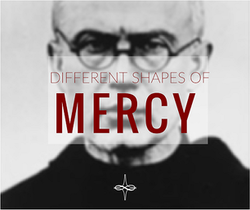 Pope John Paul II, in his homily at the Mass he celebrated at the site of the Brzezinka (Auschwitz II) Concentration Camp in 1979; called St. Maximilian Kolbe “the patron of our difficult century.” Although the dawn of a new century has since come, St. Maximilian remains a strong symbol of Christian charity today. Seventy-four years ago tomorrow, he offered up an ultimate act of charity while knowing it would cost him his own life to save another. While Maximilian Kolbe was a prisoner at Auschwitz, several men escaped from the camp. In an attempt to deter other prisoners from trying to escape, the officers chose ten men to starve to death. When one of the men chosen expressed his anguish because he had a wife and children, St. Maximilian willingly volunteered to take his place. After two weeks without food or water, St. Maximilian was the only one of the ten still alive. At that point, he was killed by a lethal injection. Although we cannot know for certain what happened while the ten men were held in the bunker, there are reports that St. Maximilian spent much of the two weeks leading the other nine in prayer to the Blessed Mother. Most of us will not be called to make the same sacrifice as St. Maximilian did for a stranger, but God calls each of us to works of charity and mercy. The Corporal and Spiritual Works of Mercy are simple ways to love God and to love our neighbor. This might mean sacrificing your Saturday afternoon to drive an elderly neighbor to her doctor’s appointment or to volunteer at a food pantry. Mercy might take the form of comforting a coworker or classmate (regardless of whether or not you are friends) when you notice them grieving. Mercy means not honking or cursing, but instead offering up a prayer when someone cuts you off in traffic. Mercy could mean not buying another sweater when you already have ten hanging in your closet and instead donating the money to a charity for the homeless. Every act of mercy requires some sacrifice--whether you are giving up time, money, or a bit of yourself--but there is no simpler way to tell God that you love Him. St. Maximilian Kolbe, pray for us! Jennifer Beckmann is an Administrative Secretary for the United States Conference of Catholic Bishops.
Pope John Paul II, in his homily at the Mass he celebrated at the site of the Brzezinka (Auschwitz II) Concentration Camp in 1979; called St. Maximilian Kolbe “the patron of our difficult century.” Although the dawn of a new century has since come, St. Maximilian remains a strong symbol of Christian charity today. Seventy-four years ago tomorrow, he offered up an ultimate act of charity while knowing it would cost him his own life to save another.
While Maximilian Kolbe was a prisoner at Auschwitz, several men escaped from the camp. In an attempt to deter other prisoners from trying to escape, the officers chose ten men to starve to death. When one of the men chosen expressed his anguish because he had a wife and children, St. Maximilian willingly volunteered to take his place. After two weeks without food or water, St. Maximilian was the only one of the ten still alive. At that point, he was killed by a lethal injection. Although we cannot know for certain what happened while the ten men were held in the bunker, there are reports that St. Maximilian spent much of the two weeks leading the other nine in prayer to the Blessed Mother. Most of us will not be called to make the same sacrifice as St. Maximilian did for a stranger, but God calls each of us to works of charity and mercy. The Corporal and Spiritual Works of Mercy are simple ways to love God and to love our neighbor. This might mean sacrificing your Saturday afternoon to drive an elderly neighbor to her doctor’s appointment or to volunteer at a food pantry. Mercy might take the form of comforting a coworker or classmate (regardless of whether or not you are friends) when you notice them grieving. Mercy means not honking or cursing, but instead offering up a prayer when someone cuts you off in traffic. Mercy could mean not buying another sweater when you already have ten hanging in your closet and instead donating the money to a charity for the homeless. Every act of mercy requires some sacrifice--whether you are giving up time, money, or a bit of yourself--but there is no simpler way to tell God that you love Him. St. Maximilian Kolbe, pray for us! Jennifer Beckmann is an Administrative Secretary for the United States Conference of Catholic Bishops. |
Details
Archives
July 2024
Categories
All
|
About |
Media |
© COPYRIGHT 2024 | ALL RIGHTS RESERVED

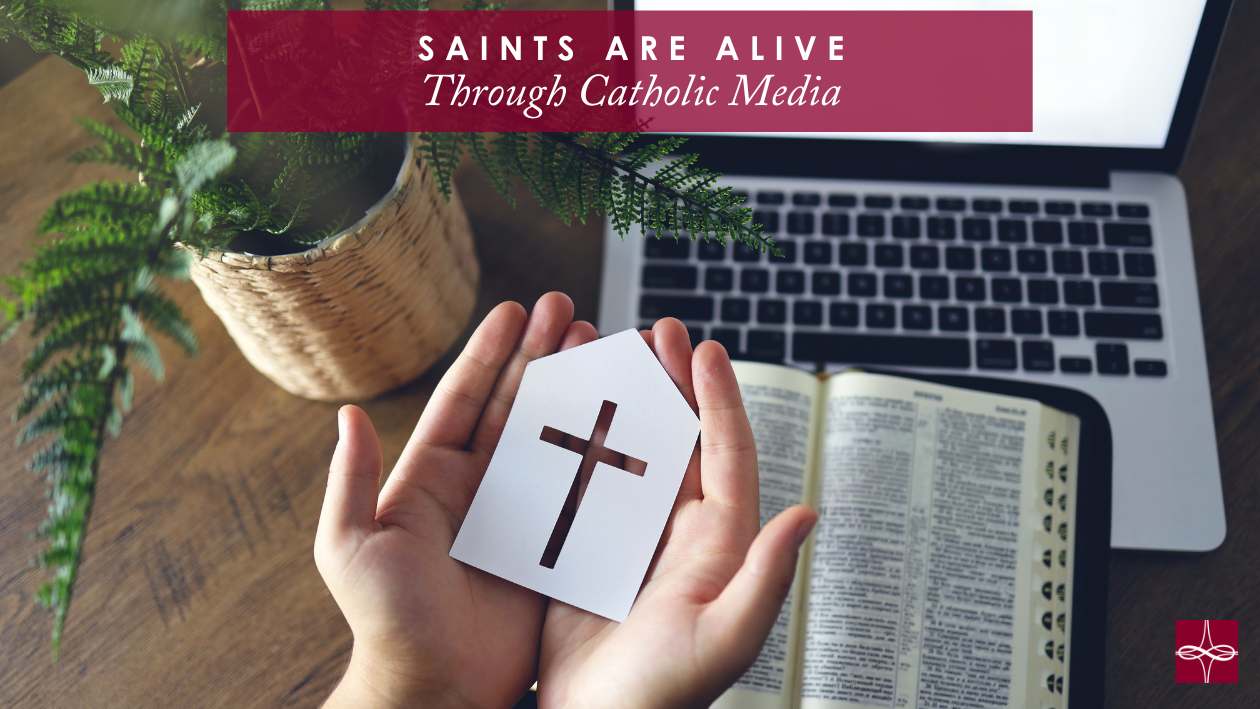

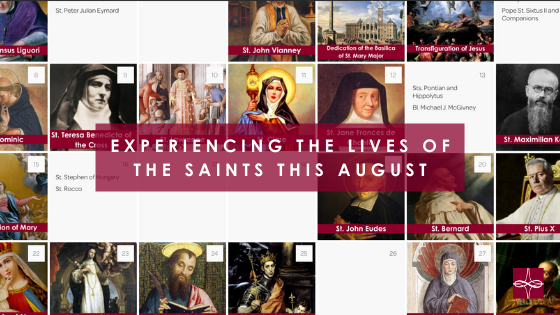

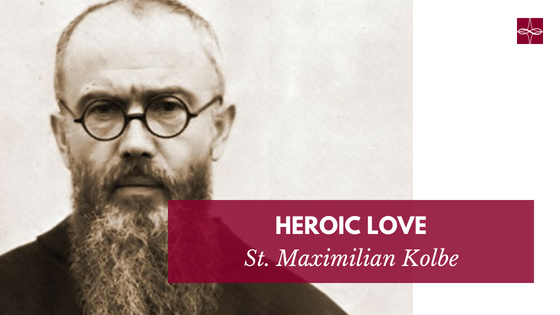

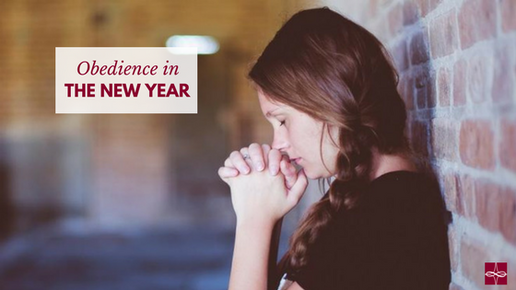
 RSS Feed
RSS Feed